$17 million of federal funding for community improvement projects awarded through ADECA
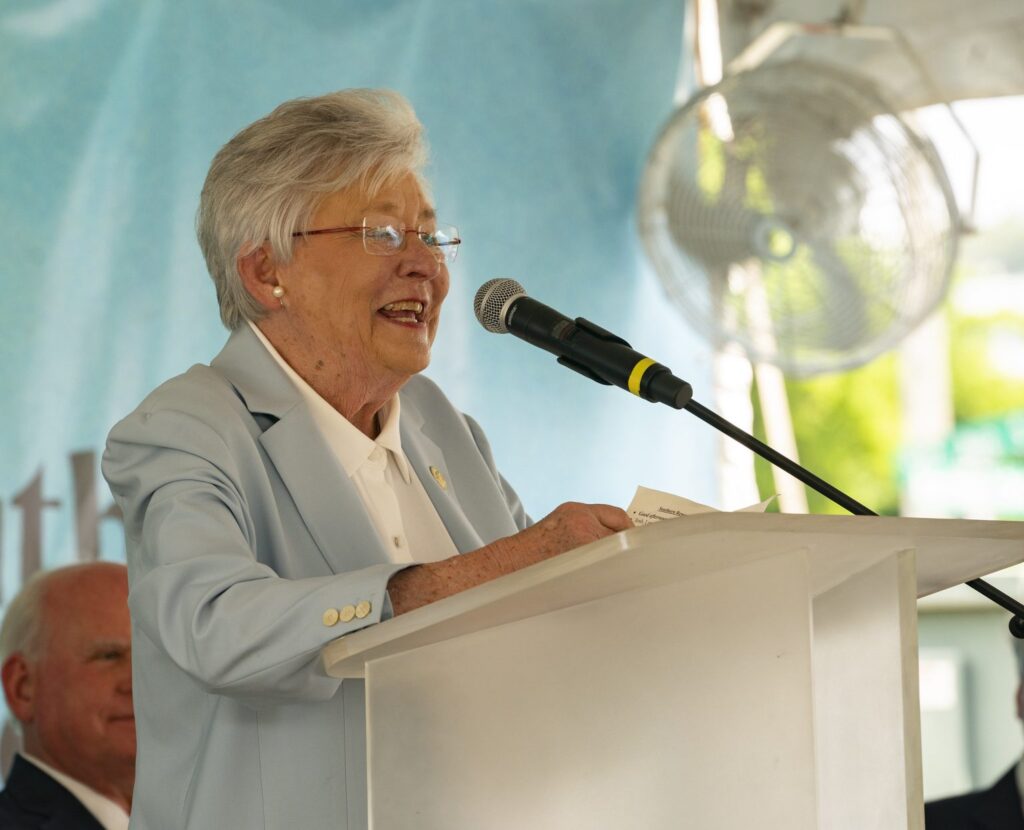
The State has announced $17 million in Community Development Block Grants (CDBGs) to benefit Alabama cities, towns and communities. The grants have been awarded to 41 Alabama towns, cities, and counties. The grants cover a range of community needs, including water and sewer upgrades, street resurfacing, fire station construction, fire trucks, and upgrading parks. “Probably no other grant program in Alabama has as widespread an impact or is as celebrated as Community Development Block Grants,” Governor Kay Ivey said about the grants. “These grants help local governments take on much needed projects that make communities safer and better places to live. I am honored to award these grants that will help so many communities across our state.” The Alabama Department of Economic and Community Affairs administers the grants with funds provided by the U.S. Department of Housing and Urban Development (HUD). “The Community Development Block Grant Program is a competitive process in which local governments examine their most pressing needs and submit applications,” ADECA Director Kenneth Boswell said. “ADECA is pleased to join Gov. Ivey in awarding these grants for projects that will improve the quality of life in these 41 communities. While there are simply not enough funds to award a grant for every project submitted, all applicants should be commended for their dedication to serving their communities.” According to the HUD website, “Eligibility for participation as an entitlement community is based on population data provided by the U.S. Census Bureau and metropolitan area delineations published by the Office of Management and Budget. HUD determines the amount of each entitlement grantee’s annual funding allocation by a statutory dual formula which uses several objective measures of community needs, including the extent of poverty, population, housing overcrowding, age of housing and population growth lag in relationship to other metropolitan areas.” CDBGs are awarded annually in several categories to ensure local governments of all sizes have opportunities to be awarded funds. Categories include: Small City – populations of 3,000 and below. Large City- populations of 3,001 and above. County – supporting primarily unincorporated areas. Community Enhancement – special projects extending beyond infrastructure improvements. Planning Fund – projects that enable governments to map out goals and long-range plans. According to ADECA the grants awarded by region include: North Alabama Attalla – $500,000 The city plans to upgrade its sewer system by replacing damaged terra cotta (clay) pipes and manholes. Improvements will be conducted in two areas of the city. Blount County – $300,000 The county plans to use funds to make road improvements in the Sugarland Lake Community. Blountsville – $400,000 The town plans to upgrade streets and sewer lines. Among streets scheduled for improvements are Walter Street, Hendrix Street, Center Street and Lee Street. Courtland- $400,000 Funds will be used to improve its water system by upgrading deteriorated and undersized water lines to improve service for its customers. Detroit – $400,000 The town will use funds to construct a new fire and rescue station with two bays. The station will be located on U.S. Highway 17. Hamilton- $500,000 The city will use funds to improve city water services for about 1,600 residents in the Mitchell Station area by installing a new booster pumping system. Hammondville- $400,000 Funds will be used to repair and resurface several roads in the town including Palmer Road, Haney Road and Winston Drive. Littleville – $400,000 CDBG funds will be used to upgrade water lines by expanding their size to increase water pressure and help lead to lower home insurance rates because of better firefighting capabilities. Red Bay – $500,000 The city will provide drainage improvements along 4th, 5th, 6th, 7th, 9th and 10th avenues in the northwestern part of the city. Town Creek – $400,000 The town will use funds to upgrade its sewer system to prevent back up of sewage into houses and sewer overflows. Central Alabama Bullock County – $500,000 The project will resurface and improve 16 roads throughout the county. Demopolis – $500,000 The city plans to make street and drainage improvements along Fairview Avenue and Cedar Crest Drive. Eclectic – $400,000 The town will use CDBG funds to upgrade its waste-water treatment facility to properly serve current households and businesses and handle growth coming into the town. Eufaula- $400,000 Funds will be used to demolish and clear approximately 55 abandoned and dilapidated structures in and around the core of the city. Franklin – $400,000 The town will use funds to demolish and clear 17 dilapidated structures throughout the town. Geiger – $372,753 The town plans to resurface five streets and improve drainage on some. Streets scheduled for improvements are Kirkland Boulevard, Payne Street, Pinson Road, Smith Street, Ninth Street and Martin Luther King Circle. LaFayette – $40,000 Funds through the CDBG Planning Grant Program will be used to help the city update its comprehensive plan to develop achievable goals for the city involving growth, revitalization and economic development. Marion — $500,000 Funds will be used to resurface Lincoln Heights and several side streets benefiting about 175 people. Moundville – $500,000 The city proposes to construct new sidewalks in the CC Loop and Alabama Avenue area and install storm water drainage in the area of Market and Griffin streets. Munford – $328,100 Funds will be used to demolish a portion of the old Munford High School and clear the debris in preparation for future redevelopment of the town’s core area. Roanoke – $500,000 CDBG funds will be used to provide drainage improvements in two areas of the city, including along Mulberry and Piedmont streets and College and Cannon streets. Shorter – $400,000 The town plans to purchase a pumper firetruck to enhance the town’s firefighting capabilities and help save properties and lives. Sumter County – $500,000 The county plans to provide public water services to nearly 160 households in the Ward and Siloam communities in southern Sumter County. Tuskegee- $500,000 The city will use funds to make water and street improvements along North Church Street. The city will make curb, gutter and sidewalk repairs and upgrade water lines to
Alabama communities receive nearly $19 million in federal grants

Almost $19 million in federal money is going to dozens of communities around Alabama to help with everything from sewers to removing old buildings. The grants announced this week by the governor’s office are from the U.S. Department of Housing and Urban Development, which provides block grants to help cities and counties. A statement says $18.7 million is going to 58 communities in amounts ranging from about $120,000 to $450,000. Cullman and Brewton are among the cities getting the maximum amount. Both towns plan work including sewer improvements. Tallassee and Scottsboro each are getting more than $200,000 each to demolish dilapidated structures. Local communities apply for the grants, which the state administers for the federal agency. Republished with the permission of the Associated Press.
Community Development Block Grants awarded to help improve 54 communities statewide
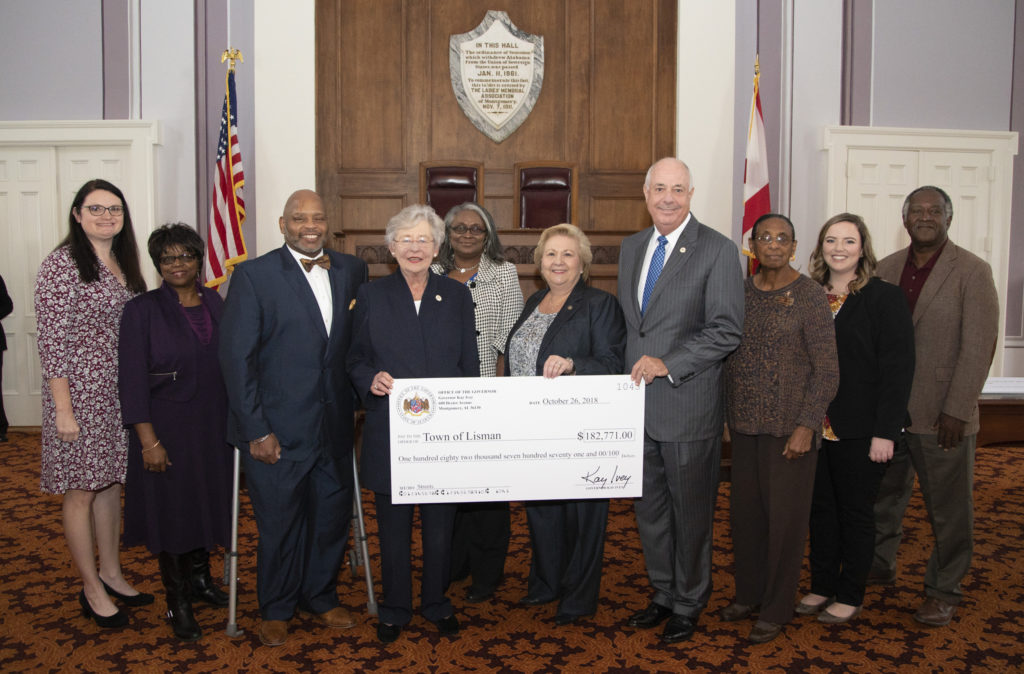
54 Alabama towns, cities and counties were awarded a total of nearly $17.8 million in Community Development Block Grants (CDBG) on Friday by Governor Kay Ivey. The 54 grants will support a number of community improvement projects including water and sewer extensions and rehabilitation, street and drainage improvements, housing rehabilitation and community centers. “The beginning of a better Alabama starts today for many residents who are without clean water to drink or safe roads to drive or suitable housing in which to live,” Ivey said. “I am pleased to award these grants to support vital community improvement projects, and I commend the dedicated local officials who sought these grants with the intent to make their communities better places to live.” CDBG are awarded annually through a competitive process in four main categories including small city, large city, counties and community enhancements. Other categories in this round include Black Belt and planning grants. Award determinations are based on the number of low and moderate-income families affected, urgency of the need and project cost efficiency. The Alabama Department of Economic and Community Affairs is administering the grants from funds made available by the U.S. Department of Housing and Urban Development (HUD). “As a former mayor whose city has been a recipient of CDBG awards, I can attest to how important this program is to our towns, cities and counties and the difference these grants can make in a community,” explained ADECA Director Kenneth Boswell. “ADECA is pleased to join Governor Ivey in the partnerships that it takes to make these grants come to fruition.” Those awarded grants, grant amounts and projects are: Small City Fund (Municipalities with populations of 3,000 or less) Beatrice – $350,000 for street improvements. Camden – $350,000 for water and sewer improvements. Carrollton – $350,000 for sewer improvements. Cherokee – $314,000 for street and drainage improvements. Detroit – $350,000 for water improvements. Falkville – $350,000 for sewer improvements. Luverne – $350,000 for water and street improvements. Millry – $350,000 for water improvements. New Hope – $350,000 for sewer and street improvements. Oak Grove – $200,000 for sewer improvements. Parrish – $350,000 for street and drainage improvements. Pisgah – $314,900 for water improvements. Rutledge – $350,000 for street improvements. Samson – $350,000 for sewer, water and street improvements. Sumiton – $350,000 for sewer improvements. Toxey – $350,000 for street improvements. Woodville – $350,000 for street and drainage improvements. Vredenburgh – $350,000 for street improvements. Large City Fund (Municipalities with populations of 3,001 or more) Andalusia – $280,000 for street improvements. Demopolis – $450,000 for sewer improvements. Elba – $450,000 for downtown revitalization. Eufaula – $450,000 for housing rehabilitation. Haleyville – $450,000 for sewer, water, drainage and street improvements. Hamilton – $450,000 for sewer, water, street and drainage improvements. Jacksonville – $429,713 for sewer improvements LaFayette – $450,000 for water improvements. Piedmont – $450,000 for sewer improvements. Roanoke – $359,487 for street improvements. Talladega – $450,000 for sewer improvements. Tuskegee – $450,000 for water and street improvements, and demolition and revitalization. County Fund (applies to 65 Alabama counties with Mobile and Jefferson counties receiving CDBG funds directly from HUD) Baldwin County – $350,000 for water improvements near the Lillian community. Hale County – $350,000 for water improvements in the Akron area. Madison County – $300,000 for water improvements east of Huntsville. Marshall County – $350,000 for street improvements on several county roads. Monroe County – $350,000 for water improvements west of Frisco City. Montgomery County – $350,000 for housing rehabilitation in Eastwood Villa. Sumter County – $350,000 for water improvements north of Cuba. Washington County – $350,000 for water improvement in the Fruitdale area. Community Enhancement Fund (municipalities of all sizes and 65 Alabama counties for projects addressing quality of life issues.) Akron – $250,000 for sewer improvements. Autaugaville – $250,000 for a new senior center. Barbour County – $250,000 for a new fire station in the Texasville community. Billingsley – $250,000 for town park improvements. Blountsville – $250,000 for sewer and street improvements. Blue Springs – $185,000 for water improvements. Butler County – $250,000 for courthouse renovations/handicapped accessibility. Cottonwood – $250,000 for street improvements. Dozier – $247,510 for demolition and clearance. Enterprise – $250,000 for demolition and clearance. Lauderdale County – $202,569 for a new senior center in the Greenhill community. Lisman – $182,771 for street improvements. Midway – $250,000 to convert a school into a community center. River Falls – $250,000 for street improvements. Black Belt Fund (municipalities and counties within a 12-county Black Belt region.) Selma – $450,000 for drainage improvements. Planning Fund (awarded to guide municipalities in orderly growth, revitalization or development.) Piedmont – $40,000 Skyline – $35,000
Senate confirms Alabama-native Paul Compton as HUD’s General Counsel

Monday night, by a vote of 62 to 34, the U.S. Senate confirmed Alabama-native Paul Compton, Jr. to be the next General Counsel of the Department of Housing and Urban Development (HUD). HUD Secretary Ben Carson welcomed the Senate’s action and said it comes at a critical time as the Department prepares to support the long-term recovery efforts following Hurricanes Harvey, Irma and Maria and other natural disasters that have affected the country. “Paul’s extensive background in real estate and housing finance will be a tremendous asset to this Department as we continue to support our nation’s housing markets and our state and local partners recovering from recent disasters,” said Carson. “I look forward to adding Paul’s expertise to our highly experienced senior team.” A former partner of the Birmingham-based law firm of Bradley Arant Boult Cummings, LLP, Compton is listed by Chambers USA as one of America’s leading business lawyers on issues related to banking, finance and regulatory matters. He has vast legal expertise in the areas of multifamily affordable housing finance, tax credit transactions and residential mortgage securitization and has also served as a legal advisor to the Alabama Affordable Housing Association (AAHA), a trade organization for developers, property managers, lenders, investors and service providers for affordable housing.
Ben Carson talks responsibility as senators question cuts

Housing Secretary Ben Carson defended the sharp budget cuts facing his agency even as he promised senators Wednesday that he would strive to help the most vulnerable Americans. Appearing before Congress or the first time since joining President Donald Trump‘s Cabinet, Carson said his agency was committed to “doing more with less.” Trump’s 2018 budget proposal calls for cutting $7 billion from the $48 billion budget for the Housing and Urban Development Department. That includes gutting the popular $3 billion Community Development Block Grant program, which funds a variety of local projects across the country. The program has done wonderful things, Carson said, “but there has been mission creep to the point where we have those dollars being used for spay and neuter clinics and flowers along highways.” He said at a time of tight budgets, “we have to be able to concentrate on what our primary goals are.” But senators from both parties questioned the cuts. Democratic Sen. Chris Coons of Delaware noted that HUD’s own website touts that the CDBG program has created thousands of jobs, supported tens of thousands of single-family home rehabilitation projects and helped over 200,000 seniors. “I could spend the rest of the afternoon giving you concrete and specific examples of how CDBG been used in my home county, home state and across this country,” Coons said. The chair of the panel, GOP Sen. Susan Collins of Maine, suggested Congress may not agree to the cuts. She told Carson the budget proposal is “just a first draft,” with lawmakers ultimately having the final say on spending plans. The administration’s plan also would cut about $2 billion from the department’s rental assistance programs, to $35.2 billion. One proposal would increase the tenant contribution toward rent from 30 percent of adjusted income to up to 35 percent of gross income, a higher category of income. Republished with permission of The Associated Press.
Housing chief Ben Carson steps up public profile in coming weeks
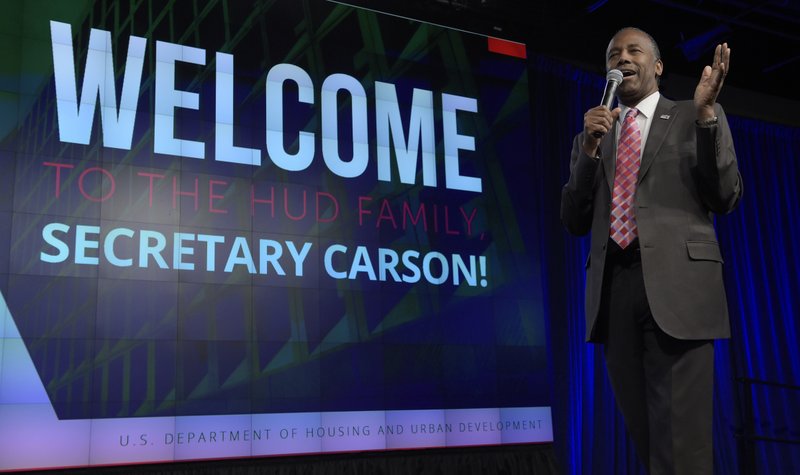
President Donald Trump‘s point man on housing, Ben Carson, takes on a higher profile this month in Washington – an opportunity to spell out his vision on federal housing policy, and to try to avoid some of the verbal gaffes that have stirred criticism in his first months on the job. On Thursday, Carson will headline a homeownership conference at his agency, the Department of Housing and Urban Development. Next week, he heads to Capitol Hill to testify before House and Senate panels about deep cuts planned for HUD in Trump’s proposed budget. It’s a shift in visibility for the renowned neurosurgeon and former Republican presidential candidate as he nears 100 days in Trump’s Cabinet. Since taking the helm of HUD in March, Carson, 65, has visited a handful of cities as part of a national “listening tour” to talk to HUD employees, housing officials and public housing residents. He’s also had appearances at some housing conferences – most of it with little or no advance notice to the media. So far, he has not shared publicly his policy agenda for the department. HUD spokesman Raffi Williams says Carson is no longer a candidate running for political office and has been busy leading a $40 billion federal agency that has more than 8,000 employees. “He’s focused on governing and crafting policies that advance HUD’s mission of creating strong, sustainable, inclusive communities and quality affordable homes for all Americans,” said Williams. When Carson has discussed his views on government and housing policy, he’s sparked some criticism. In his first full week on the job, Carson seemed to describe slaves as immigrants, saying – “there were other immigrants who came here on the bottom of slave ships, worked even longer, even harder for less.” Last week, on the radio show of close friend and conservative commentator Armstrong Williams, Carson said poverty is largely a “state of mind.” “You take somebody who has the right mindset, you can take everything from them and put them on the street and I guarantee you, in a little while, they’ll be right back up there,” Carson told Armstrong on his SiriusXM show. “And you take somebody with the wrong mindset, you can give them everything in the world and they’ll work their way back down to the bottom.” The comments from Carson, who grew up poor in inner-city Detroit, stoked outrage on social media – coming from the head of an agency that provides millions of lower-income people with rental subsidies and other housing assistance. But Rolf Pendall, co-director of a housing program at the Urban Institute think tank, isn’t worried that Carson has “been given the mission of destroying the agency.” While not defending Carson’s comments, Pendall said the housing chief’s testimony during his January confirmation hearing shows “he clearly does think that HUD is part of the solution to urban problems, to rural problems, to housing problems in the United States, and that many of its programs have been effective in the past.” Carson’s vision could become clearer when he testifies about the administration’s proposed $6 billion cut in the agency’s $47 billion budget. Slated for elimination in the Trump budget are several housing support and community development programs, such as the $3 billion Community Development Block Grant program. The plan also would cut about $2 billion from the department’s rental assistance programs, to $35.2 billion. Rental assistance programs comprise about 80 percent of the agency’s total funding. New requirements to encourage work and self-sufficiency are part of the plan. One proposal would increase the tenant contribution toward rent from 30 percent of adjusted income to up to 35 percent of gross income. The cuts would be devastating, Pendall said: “People will lose housing vouchers. They will become homeless, and some of them will die.” Diane Yentel, president and CEO of the National Low Income Housing Coalition, says she wants to see Carson focus on programs with proven results – such as the Housing Trust Fund, which the Trump budget would eliminate, or Section 8 housing vouchers. “Each of these programs not only end homelessness and housing insecurity, but they are proven to increase the educational attainment of the kids living in those affordable homes and to increase the lifetime earnings of the kids living in those homes,” Yentel said. Yentel called Trump’s budget proposal “extreme overreach” and said she worries it moves the goal posts so far that “it creates an environment where cuts only half as deep seem like a reasonable compromise.” Republished with permission of The Associated Press.
HUD could face steep cuts, but Ben Carson says numbers early
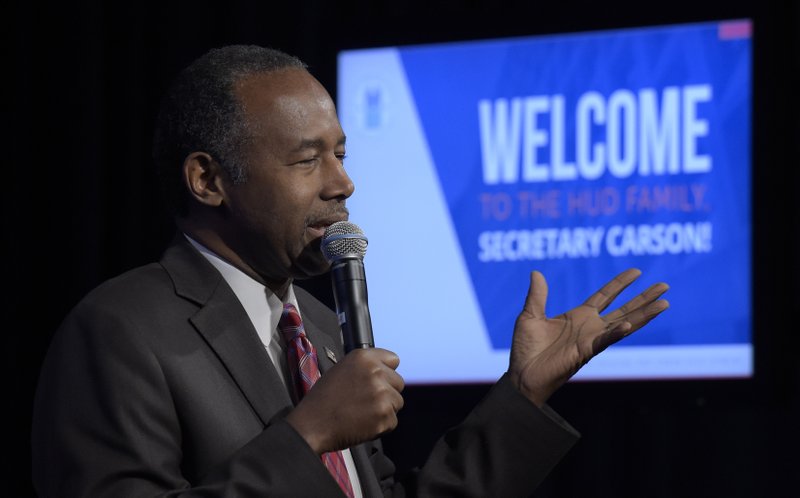
Housing Secretary Ben Carson sought Thursday to reassure his agency that budget cuts may not be as steep as some fear, even as housing advocates and others brace for deep reductions to public housing and anti-poverty programs. The cuts said to be under consideration, more than $6 billion, would target community development block grants and some public housing money. The idea would be to help offset some of the $54 billion increase in defense spending that President Donald Trump is seeking. In an email Thursday to Department of Housing and Urban Development employees, the newly confirmed Carson cautioned that the budget numbers were preliminary and that “starting numbers are rarely final numbers.” “Rest assured, we are working hard to support those programs that help so many Americans, focus on our core mission, and ensure that every tax dollar is spent wisely and effectively,” wrote Carson, who was confirmed as HUD secretary late last week. The Washington Post reported late Wednesday that early numbers for fiscal year 2018 showed HUD’s overall budget being slashed about 14 percent, to $40.5 billion — including cuts of about $2 billion from public housing funds and the elimination of the Community Development Block Grant Program, which funds local improvement efforts and other programs. At his confirmation hearing in January, Carson took a softer approach toward the role of the federal government than he sometimes did on the presidential campaign trail, where he challenged Trump for the GOP nomination. When reminded that he had called for across-the-board agency spending cuts of 10 percent during the campaign, Carson told the Senate banking committee that he later modified that amount to 1 percent. He also said HUD’s rental assistance programs are “essential” to millions of Americans and said the agency had many good programs. He added, though: “We don’t want it to be way of life. … We want it to be a Band-Aid and a springboard to move forward.” New York City Council Member Ritchie Torres said public housing in his city is so financially and physically fragile that it cannot safely absorb the shock of a 14 percent reduction in HUD’s budget. “The budget cuts will lead to more public health hazards in public housing,” Torres, chair of the council’s committee on public housing, said in an interview Thursday. “It will lead to more leaking and molded conditions in public housing. It will lead to more neglect of the physical infrastructure.” In Newton, Massachusetts, Mayor Setti Warren said killing the community development block grants would be devastating to his community. “This critical program provides people with higher paying jobs, affordable housing and opportunities for children to reach their full potential,” said Warren. The block grant money has been used in Newton for infrastructure improvements to housing for seniors, open space projects in poorer neighborhoods and money for social service programs for children such as Boys & Girls Clubs. National Urban League President Marc Morial said cuts like those that are being discussed would undercut the agency’s mission. “It’s a cruel and unusual hit to say that we’re going to cut the most vulnerable citizens in America and we’re going to go spend the money on the implements of war,” Morial said. Republished with permission of The Associated Press.
Retired neurosurgeon Ben Carson gets hearing for HUD chief
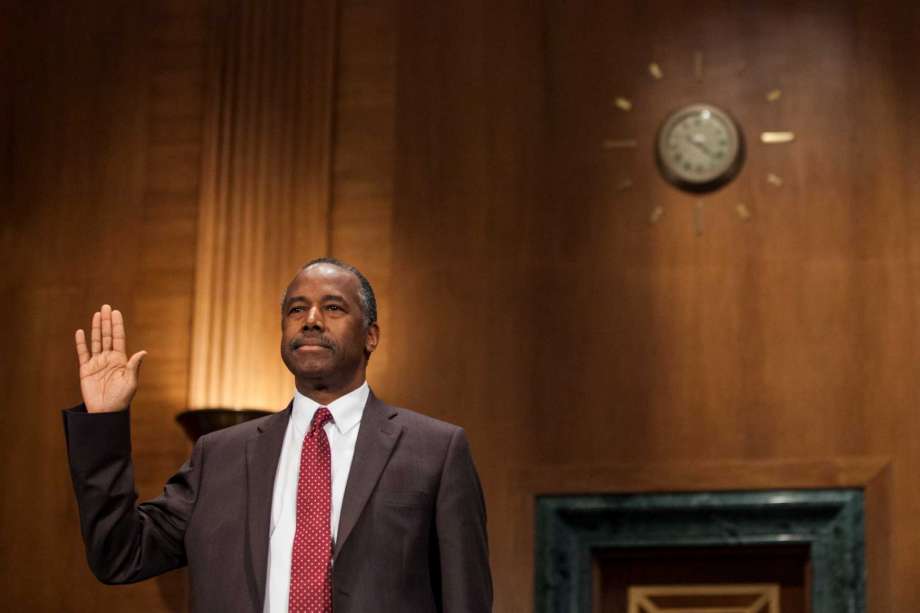
Former Republican presidential candidate Ben Carson defended his experience and credentials Thursday to serve as the nation’s new housing secretary, turning to his life story to show that he understands the needs of the country’s most vulnerable. President-elect Donald Trump wants Carson, a former White House rival, to lead the Department of Housing and Urban Development, a sprawling agency with 8,300 employees and a budget of about $48 billion. At his confirmation hearing before the Senate Banking, House and Urban Affairs Committee, the famed neurosurgeon talked about growing up in inner-city Detroit with a single mother who had a third-grade education and worked numerous jobs to keep a roof over their heads and food on the table. “I have actually in my life understood what housing insecurity was,” he told lawmakers. Democrats in the GOP-run Senate questioned his experience. Carson said one of the things he’s learned in private life as part of various boards is how to find a good CEO. He said a good CEO doesn’t necessarily know everything about running a particular business, but he knows how to select people and use their talents. Carson said HUD’s rental assistance programs are “essential” to millions of Americans. The department, he said, has a lot of good programs, but “the progress perhaps has not been as great as one would like to see.” He added: “We don’t want it to be way of life. … We want it to be a Band-Aid and a springboard to move forward.” Ranking Committee Democrat Sen. Sherrod Brown of Ohio and Sen. Elizabeth Warren, D-Mass., pressed Carson about whether he could guarantee that no HUD money would benefit Trump or his family, which has made its fortune in real estate. “I will not play favorites for anyone. … I will manage things in a way that benefits the American people,” Carson said. Carson displayed a softer approach toward the role of the federal government than he sometimes did on the presidential campaign trail. When reminded that he had called for across-the-board agency spending cuts of 10 percent during the campaign, Carson noted that he later modified that amount to 1 percent. Carson talked about a more “holistic approach” to helping people and developing “the whole person.” For example, he said, HUD could work with other agencies such as the Education and Labor Departments on better access to a quality education and apprenticeship programs to train workers. Several former HUD secretaries, Democrats and Republicans, wrote the committee in support of Carson. The letter was signed by Henry Cisneros, secretary under President Bill Clinton, and Mel Martinez, Alphonso Jackson and Steven Preston, who worked for President George W. Bush. The soft-spoken Carson, the only black major-party candidate in the 2016 presidential race, grew up poor. He attended Yale University and the University of Michigan Medical School, and was the first African-American named as head of pediatric neurosurgery at Johns Hopkins Children’s Center in Baltimore. In 1987, Carson pioneered surgery to separate twins joined at the back of the head. In 2013, he entered the national political spotlight when, during the National Prayer Breakfast, he railed against the modern welfare state. President Barack Obama was sitting just feet away. Before Thursday’s hearing, Carson had said little publicly about federal housing issues. In a 2015 opinion piece, he criticized an Obama administration fair housing rule as government overreach. At his hearing Thursday, he told lawmakers he would work with local HUD officials to “make sure that fairness is carried out.” Republish with permission of The Associated Press.
Ben Carson rose from poor childhood to acclaimed neurosurgeon

Retired neurosurgeon Ben Carson, picked by Donald Trump to run the Housing and Urban Development Department, has often recounted his childhood as the son of a single mother in inner-city Detroit. Carson has not said whether his family ever lived in federally funded housing or received Section 8 subsidies to help pay rent, but as a political figure he has criticized such public assistance programs for creating “dependency” on the government among low-income minorities. “I’m interested in getting rid of dependency, and I want us to find a way to allow people to excel in our society, and as more and more people hear that message, they will recognize who is truly on their side and who is trying to keep them suppressed and cultivate their votes,” Carson said in a speech at the Conservative Political Action Conference in 2015. In his 1996 autobiography “Gifted Hands,” Carson wrote of the humiliation he felt using food stamps from his mom to pay for bread and milk, and said he began to excel at school only after receiving a free pair of glasses that allowed him to see the lessons written on chalk boards. After Carson’s mother divorced his father, she received a small house in the settlement. But as her financial situation deteriorated, Carson and his siblings were forced to move into a succession of tenements and apartment buildings, some of which he described as having “hordes of rats” and “armies of roaches.” With the help of financial aid and scholarships, Carson attended Yale University and the University of Michigan Medical School before being the first African-American named as the head of pediatric neurosurgery at Johns Hopkins Children’s Center in Baltimore. There, he garnered national acclaim for directing the first surgery to separate twins connected at the back of the head. Carson’s rise to political prominence began with a 2013 speech at the National Prayer Breakfast, where he gave a withering critique of the modern welfare state and the nation’s overall direction while President Barack Obama was seated just feet away. During the 2016 Republican presidential primary, Carson’s inspirational life story, Christian faith and anti-establishment message briefly catapulted him last year ahead of Trump and other rivals in opinion polls. But his success on the campaign trail quickly crumbled amid questions about whether elements of his rags-to-riches autobiography were exaggerated or fabricated – including a purported childhood fit of rage he tried to stab his best friend in the belly only to be foiled by a belt buckle. Carson’s business dealings also faced scrutiny, including his ties to a wealthy Pittsburgh dentist whom he helped avoid prison time for felony health care fraud. The Associated Press first reported last year that Carson invested millions of dollars in real estate deals with Alfonso A. Costa, whose dentistry license was revoked following a felony conviction. According to required financial disclosure forms he filed in 2015, Carson his wife made between $200,000 and $2 million a year from those real estate investments. Costa also served on the board of Carson’s charity, the Carson Scholars Fund, which provides college scholarships to children in need. Records show Carson appeared as a character witness at his friend’s 2008 sentencing hearing, pleading with the judge for leniency. Though he faced up to 10 years in prison, Costa received a greatly reduced sentence of one year of house arrest served in a suburban mansion. Yet in his 2013 book “America the Beautiful,” Carson called for severe penalties for those convicted of health care fraud, including at least a decade in prison and “the loss of all of one’s personal possessions.” Republished with permission of the Associated Press.
“Over-income” Alabamians abusing public housing, audit finds
A recent internal audit by the U.S. Department of Housing and Urban Development founds that tens out thousands of Americans are “over-income” by public housing standards, yet continue to live in subsidized dwellings anyway. The report found 25,226 families who earned more than the $30,200 maximum for eligibility in Section 8 housing, named after a federal law governing publicly subsidized neighborhoods. A recent inquiry by an Alabama reporter found dozens of cases in Mobile County alone, including one man who makes some $110,000 a year, but continues to enjoy $550-a-month rent courtesy of taxpayers. “Why would you even want to live like this?” a public housing resident recently said to Mobile’s WPMI. “If I was making that much money, I wouldn’t even want to stay here.” The HUD audit found multiple people with assets of more than a million dollars living under federal housing authorities, including one New York family who reported earning $497,911 one year. Alabama U.S. Rep. Bradley Byrne said he was dismayed by the news, but not surprised by reports of fraud and abuse by some beneficiaries. “I wish I could say I was shocked, but I’m not,” said Byrne, a Fairhope Republican who has represented Alabama’s 1st Congressional District since 2013. “This is just another reason why we need to look at a total rethink and reform of all those programs because we are wasting taxpayer dollars, and we don’t have ’em to waste,” said Byrne. “We want to get people in it if they really need it, and then find the means to get out as quickly as we can so they can get a job and support themselves.” The audit contained a recommendation that the department “direct housing authorities to establish policies to reduce the number of overincome families in public housing,” a step that could save American taxpayers an estimated $104.4 million the report said would be better used assisting eligible low-income families in need of housing assistance. HUD responded to a media inquiry on the audit, saying “there are positive social benefits to having families with varying income levels residing in the same property.”
Jeff Sessions joins fellow conservatives to push back against new federal housing rules
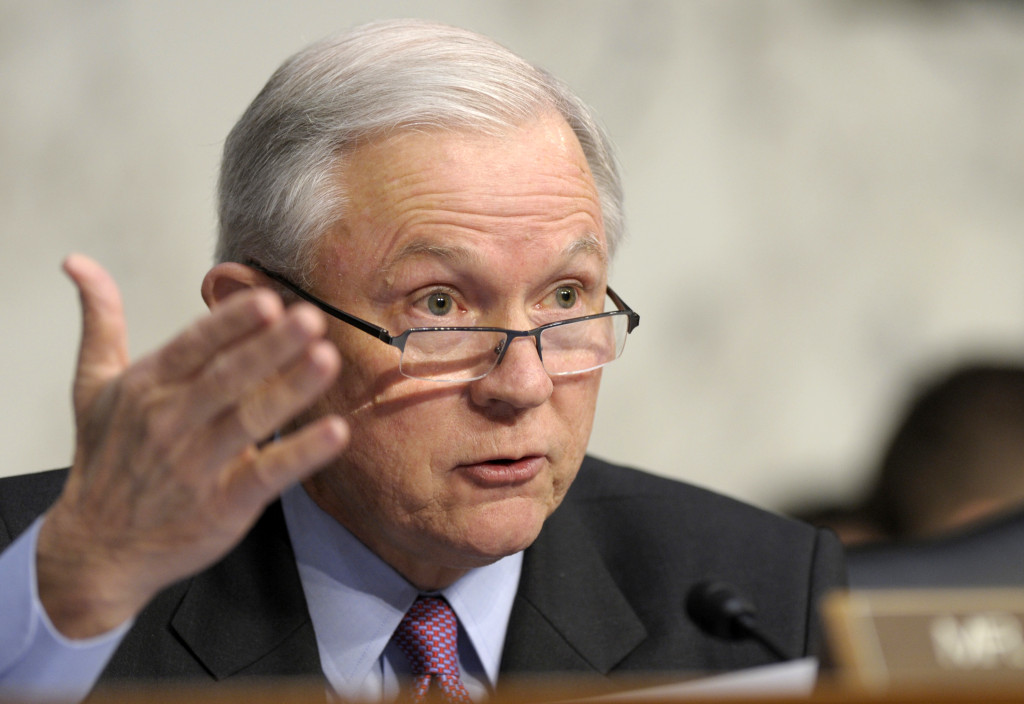
U.S. Sen. Jeff Sessions joined with five fellow members of the Republican Senate majority in co-sponsoring a bill by Sen. Mike Lee of Utah designed to stop President Barack Obama‘s “assault on the suburbs,” as proponents of the measure have called new federal housing regulations. The move comes as new provisions of a Department of Housing & Urban Development initiative called Affirmatively Furthering Fair Housing (AFFH) would create a National Zoning Board and seek to increase Section 8 public housing in affluent cities to forward its stated goals of “promoting fair housing and equal opportunity.” Arizona Rep. Paul Gosar sponsored the original House version back in April. He characterizes the new program differently. “The AFFH rule, soon to be implemented by HUD … is another top-down, social engineering experiment concocted by bureaucrats in Washington, D.C., that attempts to federalize local zoning decisions,” Gosar said in a prepared statement. “Similar to other big government policies from this administration, the flawed AFFH regulation will result in more harm than good by way of increased taxes, depressed property values and further harm to impoverished communities. This is extortion and the Obama Administration should not be mandating that millions of dollars in grant money for local communities be dependent on turning over local zoning decisions to the federal government.” The new regulatory scheme would effect Alabama neighborhoods such as Mountain Brook in Jefferson County, which is more than 90 percent white. Federal authorities would almost certainly move resources from places that are already heavily poor and African-American, such as parts of urban Birmingham to suburban locales, arguing it is in the national interest to encourage urban housing dwellers to share the same resources and environs. Opponents of the plan — including many local suburban zoning boards and residents — for their part, argue it is their prerogative to live where they want without federal intervention to decide who their neighbors will be. Toward that end, the bill would dismantle the program by legislatively forcing the rule to be withdrawn, as well as nixing the Assessment Tool HUD plans to use to implement it. Beyond the negative un-doing mechanisms, it also includes what Gosar called a “federalism provision” which would require HUD to consult with local governments for the purposes of furthering the Fair Housing Act of 1968, which created the department. Sessions was joined by Sens. Marco Rubio, David Vitter, Tom Cotton and Mike Enzi in co-sponsoring the measure. The original House bill — still circulating as the 114th Congress went into summer recess Thursday — had 23 co-sponsors within the majority GOP caucus.


